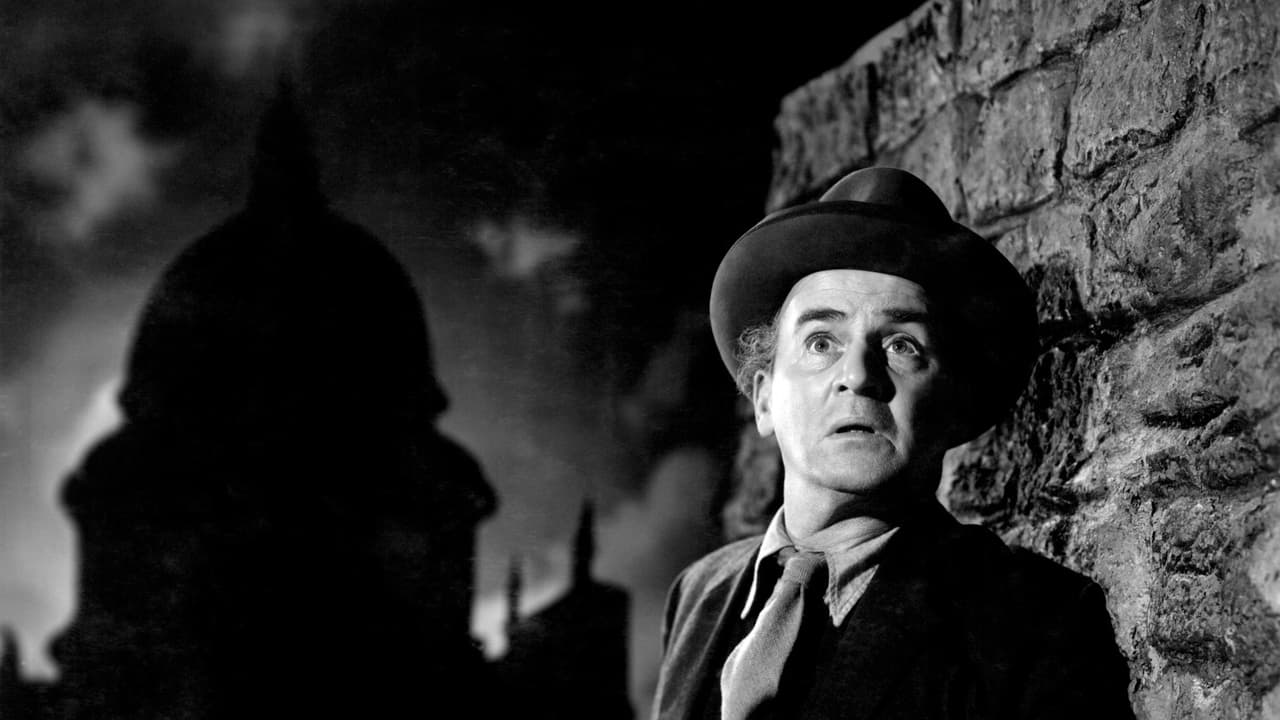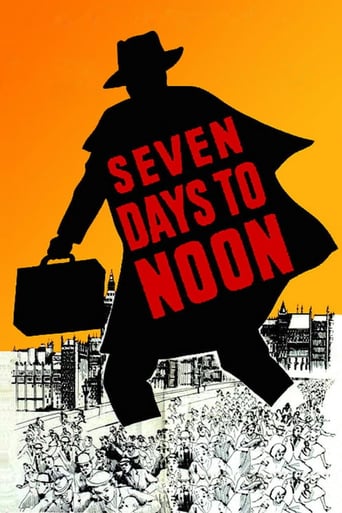

The respected Brothers Boulting John and Roy depict London on the brink of certain annihilation in their suspenseful, spine-tingling, black & white, disaster thriller "Seven Days to Noon," a taut white-knuckled parable about unreasonable professor gone mad who plans to destroy London with a stolen nuclear weapon that fits into a suitcase. This lunatic is no idiot, but he is suffering from fatigue of creating one of the deadliest weapons on Earth and he himself will detonate it if the British Prime Minister refuses to halt a program designed to develop weapons of mass destruction. Co-director and scenarist Roy Boulting of "Run for the Sun" and "The 39 Steps" remake writer Frank Harvey have fashioned a gripping melodrama based on a provocative story written by Paul Dehn (later to pen "Goldfinger" as well as several sequels for the original "Planet of the Apes" movies) and James Bernard. Unlike Dehn with whom he shared story credit, Bernard became better known for the orchestral scores that he wrote for Hammer horror epics. Incidentally, Dehn and Bernard received the Oscar for Best Writing, Motion Picture Story during the 1952 Academy Awards. The Boulting Brothers were nominated for the Golden Lion at the Venice Film Festival in 1950, and "Seven Days to Noon" was nominated to the BAFTA Film Award in 1951. Mind you, this 94-minute melodrama still holds up in terms of tension and suspense right up to the end. The Boultings have managed a marvelous feat in capturing the hysteria when the government decides to evacuate the area that the bomb will obliterate before the titular deadline. Professor Willingdon (Barry Jones of "The Bad Lord Byron") mails a letter with an ultimatum to the British Prime Minister (Ronald Adam) that seven days from then, he will trigger a devastating UR12 bomb developed at a secret British scientific research laboratory. Scotland Yard Superintendent Folland (André Morell of "The Bridge on the River Kwai") heads up the investigation while all of London prepares to meet their maker. Gradually, the Boulting generate suspense until you're ready to gnaw off your fingernails. The authorities play a game of cat and mouse to run down the mad scientist but he stays a step ahead of them. Although he changes his appearance by shaving off his mustache, the desperate Willingdon finds it difficult to avoid not only detection or capture because his photograph has been posted all over London. This is one British thriller that takes itself seriously and gains momentum right up to the very last second. A must-see for film historians that are studying the development of anti-nuclear bombs cinema in the early 1950s. Incidentally, the cinematographer who lensed "Seven Days to Noon" was none other than "Star Wars" lenser Gilbert Taylor. James Bond fans will spot Geoffrey Keen in a small role in a scene at a bar where Willingdon goes to have a brandy and soda. André Morell is terrific as the level-headed Scotland Yard Superintend who leads the manhunt for Willingdon. Several times throughout the narrative, our conscientious scientist eludes the authorities just when they are about to pounce on him. The shots of desolate London locations evacuated look thoroughly convincing, and the Boultings forge the atmosphere of paranoid. Altogether, "Seven Days to Noon" ranks as top-flight entertainment.
... View MoreNot one man, not even one group or organization, should have access to so much power that could destroy an entire city. That is the plot of this early cold war thriller of nuclear power threatened to blow up London by a disillusioned professor. This intense nail-biting clock ticker is just what the doctor ordered to warn audiences of what could happen, and ironically is what has happened. This is terrorism at its scariest before the word "terrorist" was a frequently used word in our vocabulary, because the culprit is threatening to destroy their own countrymen. Sound familiar?Real time photography of Londoners going about their daily tasks is interspersed with the filmed drama, adding much tension to the already frightening theme. The story intersperses the quest to find the bomb and defuse it before its too late, evacuate the entire city (an empty London is a scary looking London!), and the personal dramas of those involved, including the professor's own family.The dramatic structure is aided by an excellent screenplay, crisp photography and an appropriately tense musical score. The cast of excellent British actors seem so natural in their performances that they seem not to be acting, but reacting to the horrors of the story which they are dramatizing. Particularly excellent are Barry Jones as the nervous professor and Joan Hickson as the flirtatious landlady who rents a room to him and becomes an unwilling participant in his quest for mass destruction.
... View MoreAn unexpected masterpiece from the Boulting Brothers, "Seven Days to Noon" is an object - lesson in how to make a small - budget suspense movie .It works supremely well as such,but it is rather more than that.The "Atomic Age" was upon us,anti - communist propaganda was coming to a peak and nuclear sabres were being rattled. There was a real fear that World War three might indeed be the war to end all wars and everything else as well.In such a climate a scientist with a conscience might well decide to rattle a few sabres himself in the cause of what he considered the collective good. By threatening to explode a nuclear device in Central London within seven days unless all work on atomic weapons is suspended Mr B.Jones causes a very British panic i.e.things carry on much the same right up until the last moment,an Ealingesque concept if ever there was one. The Boulting Brothers' proposition that the atom bomb was "a bad thing" might seem to belong to the era of duffel coats,beards and open - toed sandals but in fact predates it by several years. Over half a century later it is glaringly obvious to Londoners that any bomb,whether it contains Uranium 235 or fertiliser is a very bad thing and to find one bomber in a big city is a task beyond human capability. By pointing this out to the public in 1950 the Boultings were breaking new ground. Don't watch it through 21st Century eyes then complain that people aren't like that -obviously they're not.But they were then. What you see is the way people behaved,the way they spoke and inter - acted as much as "Eastenders" reflects daily life in London now. People expressed anger,love and hatred without foaming at the mouth. Five years after the end of the war there was still a little of the "Let's all pull together" spirit abroad in the air.Everybody knew what it meant to be British but nobody spoke about it - the polar opposite of today. Although today the Boultings are best remembered for their comedies this little masterpiece from early in their career is a worthy contender for consideration as their finest work.
... View MoreIn this day and age when atomic weapons are everybody's bow and arrows the plot of this film has never been more up to date. The setting of the film in London with the devastation left by the bombing in World War II made a great back drop for the story. I can remember when London really looked like that. Both the plot and the characterisation are believable and the acting more than adequate. But star status must go to the people of London who back in 1950 still had the camaraderie and spirit forged by six years of war. This was a time when people still looked out for each other and this come over well as the story unfolds. With our video making mobile telephones and instant access to news this film may seem tame and dated but don't let the black and white format fool you this is a good story, well told and well worth seeing. Oh, and by the way, we really did talk like that back in 1950.
... View More